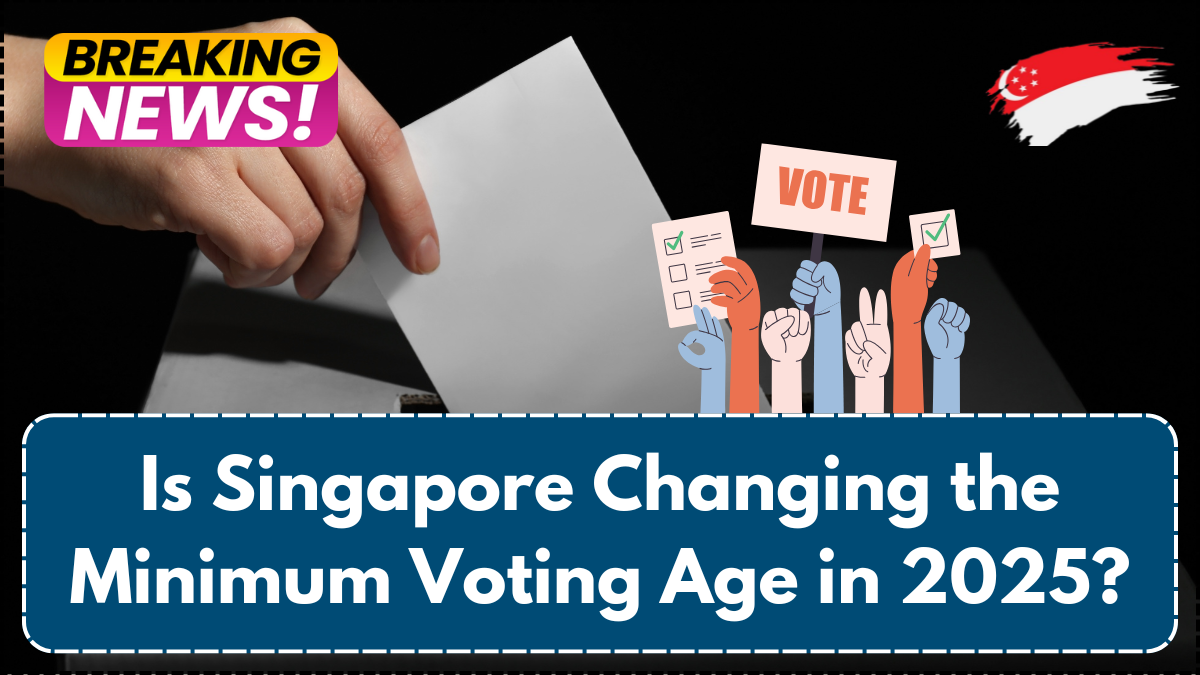As of June 2025, the conversation around adjusting the Minimum Voting Age in Singapore is gaining renewed attention. Currently, Singaporeans are allowed to vote from the age of 21. This standard has remained unchanged since the country’s independence. However, growing calls from political observers, youth organizations, and civil society groups have prompted a national discussion about whether the voting age should be lowered to 18.
The Parliament has not officially amended the law, but a policy review is reportedly underway. This review focuses on whether aligning Singapore’s voting age with international norms will increase youth political engagement. In nations like the UK, Brazil, and Indonesia, 18 is the standard threshold. As of mid-2025, Singapore’s Government has not committed to a timeline but has acknowledged that electoral reform is a priority under consideration.

Why the Debate Now?
Singapore’s demographic and political landscape is shifting. Youth voices are more prominent than ever, and civic engagement among the 18-20 demographic has surged. With issues like climate policy, employment, and digital freedoms at the forefront, younger citizens are demanding a say in shaping the nation’s direction.
Advocates for reform argue that many 18-year-olds are legally adults, pay taxes, and can serve in the military—yet they’re excluded from national elections. This has raised concerns over fairness and representation. The 2025 electoral reform discussions are part of a broader movement to modernize Election Age Rules 2025 to reflect the evolving role of youth in society.
Table: Current vs. Proposed Voting Age Comparison
| Country | Current Voting Age | Proposed/Actual Voting Age Reforms |
|---|---|---|
| Singapore | 21 | Under Review (Proposal: 18) |
| Indonesia | 17 | No Change |
| United Kingdom | 18 | No Change |
| Malaysia | 18 | Lowered in 2021 |
| Australia | 18 | No Change |
Understanding Singapore’s Voting Framework
The Singapore Voting Age is established under the Parliamentary Elections Act, which currently sets 21 as the minimum age. To qualify, citizens must also be registered on the electoral roll and must not be disqualified by mental incapacity, criminal convictions, or bankruptcy.
Adjustments to these laws require legislative action, usually initiated by the Elections Department or through Parliamentary debate. No bill has been introduced in 2025 so far, but discussions within policy circles suggest that the topic is likely to appear on the legislative agenda by the end of the year.
What Could Change by the Next Election?
Singapore’s next General Election is expected by 2025 or early 2026. If reforms are passed by the end of this year, it’s possible that 18-year-olds could cast their votes for the first time. This would mean significant updates to electoral registers, outreach programs to inform new voters, and possibly an updated civic education curriculum.
Such a shift would also impact political campaigning strategies. Parties may need to address youth-centric issues more directly, adjusting their platforms to resonate with younger voters. The change would bring Singapore in line with a global trend recognizing youth agency in democratic processes.
Conclusion
While no formal decision has been made, the conversation around changing the Minimum Voting Age in Singapore reflects larger societal shifts. As Singapore continues to modernize its democratic institutions, including potentially adjusting its Election Age Rules 2025, the inclusion of younger voters appears increasingly likely. With youth activism rising and civic awareness growing, the political landscape could see a notable shift in the coming years.
FAQ
What is the current minimum voting age in Singapore?
The current minimum voting age is 21 years old.
Is Singapore lowering its voting age in 2025?
As of June 2025, no formal change has been enacted, but discussions and reviews are ongoing.
Why is there a push to lower the voting age?
Advocates argue that 18-year-olds can serve in the military, pay taxes, and are mature enough to participate in national decisions.
When could the new voting age take effect?
If reforms are approved by late 2025, they could be implemented in time for the next General Election.
How would this impact elections in Singapore?
Lowering the voting age would expand the electorate, likely shifting political focus toward youth-related issues and increasing civic participation.
Click here to know more.
Akesh is a furniture expert with years of experience in design and craftsmanship. Specializing in sustainable materials, he shares his expertise to help people create stylish and functional living spaces.
